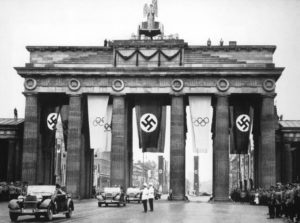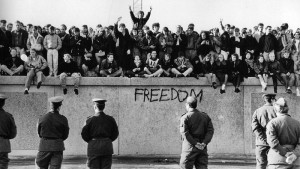This essay first appeared in the Mystery Tribune
Spy novelists have long been drawn to Berlin’s dark and violent past, and its mix of seamy counterculture and shadowy intrigue. That should come as no surprise: Germany’s rulers prosecuted, and lost, two world wars, and after 1945 the country occupied the frontlines of the Cold War. With these conflicts came heightened covert activity—false flag operations, code breaking, sabotage, and spying by all sides.
As the capital of Germany, Berlin served as the center of political and military power for both the Kaiser and Hitler. During the Nazi years, numerous intelligence agencies (Gestapo, SD, Abwehr) competed for influence with the Führer, while at the same time Germany’s adversaries sought to place moles in the inner councils of Hitler’s regime. After the war, occupied Berlin became a place where East and West intersected, a unique Treffpunkt (meeting point), a cloak-and-dagger venue for the Western Allies and the Soviets. The city swarmed with agents. By the late 1950s, the U.S. had 15 separate intelligence outfits at work in the city, and the KGB had taken up residence at a massive complex at Karlshorst in East Berlin. Both sides recruited sources, placed penetration agents, and, when it was deemed necessary, took more “direct action,” including abductions and assassinations. Soviet leader Nikita Khrushchev called Berlin a “swampland of espionage.” Before the Wall went up in 1961, agents and informants could cross sector borders without too much trouble.
Beyond the clandestine, Germany’s largest city has offered an intriguing, and sometimes contradictory, backdrop for fiction. Berlin has been a cosmopolitan home for artists, writers, painters, actors, and the “decadent” demimonde for more than a hundred years—think the “anything goes” atmosphere of Cabaret during the 1920s and 30s, or the free-spirited city of bohemians, drop-outs, permanent students, and punk-rockers that David Bowie and Iggy Pop inhabited in the 1970s. There’s always been a gritty Berlin underworld, filled with petty thieves, pimps, prostitutes, con men, and crime bosses. Berliners have proved remarkably resilient. They’ve endured Allied bombing raids, the brutal Soviet pillage of the city in 1945, the Berlin Airlift, the erection of the Wall, and the years as a divided and (for West Berliners) isolated place.
Berlin’s spies
John le Carré, a master of the espionage genre, began his breakthrough 1963 bestseller The Spy Who Came in from the Cold with a fatal encounter at a Berlin checkpoint, and ended it with a desperate escape attempt at the Wall. In the character of Alex Leamas, a jaded MI6 veteran, Le Carré offered readers a more realistic and nuanced alternative to James Bond, Ian Fleming’s dashing super-spy. Graham Greene praised the novel as the best spy story he had ever read, and JB Priestley said it possessed “an atmosphere of chilly hell.” The screen version of the book, directed by Martin Ritt, starred Richard Burton and Claire Bloom, and introduced the general public to Le Carré’s bleak vision of the twilight struggle between the liberal democracies and the Soviet bloc.
Le Carré wrote later that Berlin in the 1960s was “a paradigm of human folly and historical paradox.” Stationed at the British Embassy in Bonn, he had “watched the Wall’s progress from barbed wire to breeze block; I watched the ramparts of the Cold War going up on the still-warm ashes of the hot one.” (Le Carré has had a life-long interest in Germany and its literature and culture; he has set many of his other thrillers there including A Small Town in Germany, The Looking Glass War, and A Most Wanted Man.)
Other spy novelists have mined the rich material in Berlin’s troubled history, producing numerous thrillers, including series by Len Deighton (ten Bernard Samson novels), John Lawton (two Joe Wilderness books), and, most notably, David Downing (six John Russell novels) and Philip Kerr, with his critically-acclaimed Bernie Gunther series.
In Downing’s first Berlin novel, Zoo Station, we meet John Russell, an Anglo-American expat journalist of leftist political tendencies who has been living quietly in Berlin for more than a decade. It’s 1939, and Hitler is threatening war with Poland. Russell wants to stay in Germany; he has a glamorous girlfriend, an actress named Effi Koenen, and a young son, Paul, from a failed marriage. As the Third Reich moves toward outright conflict, Russell draws the attention of the Soviet, German, and British intelligence agencies, who all see him as a potentially valuable operative. To protect his family, Russell begins to cooperate with various and sundry spymasters, reluctantly compromising himself in the process.
In the five novels that follow (the Train Station series), Russell struggles in his role as amateur spy, caught in the very dangerous game of “playing the ends against the middle,” as Germany careens into war. While he despises the Nazis, Russell has little choice but to work with the Abwehr (while also running errands for the NKVD, MI6, and American military intelligence). When he can, Russell tries to help Jewish friends and acquaintances escape the roundup in Berlin, the beginning of the Final Solution, but there are limits to what he can accomplish—the Gestapo is a watchful and ever-present threat. Downing’s novels brilliantly capture the fear and paranoia of life in a dictatorship, and they illustrate the moral conflicts that confront average men and women face in a society that has abandoned the rule of law. Downing paints a harrowing portrait of the impact of the Nazi regime on Berlin and the brutal consequences of German militarism, the devastation of the city by Allied bombing and by the rampaging Red Army.
The prolific Philip Kerr offers an equally dark vision in his Berlin Noir trilogy (March Violets, The Pale Criminal, and A German Requiem), which he had extended into another nine (and counting) Bernie Gunther novels. Kerr’s Germany is run by uniformed criminals with swastikas on their armbands, arrogant men driven not only by a warped racist ideology but also by greed, lust, and corruption. While Kerr’s work is categorized as crime fiction, his novels bridge several genres— they’re a compelling mashup of police procedural, murder mystery, and spy thriller. His plots typically follow the thriller outline established by John Buchan in The 39 Steps: take an ordinary man, give him a difficult and dangerous mystery to solve with a pressing deadline, and then have him chased by shadowy enemies.
Kerr’s brash, wise-cracking Everyman hero Bernie Gunther is a veteran of the Berlin police department from the Weimar years. He’s a survivor, willing to work for the Nazi elite in solving politically-sensitive crimes even as he recognizes the absurdity of traditional police work when civilized moral boundaries have been erased. Gunther has a stubborn sense of right and wrong, and when confronted with evil, he’s not above settling scores and seeking rough justice. The series, which spans the 1930s, the Second World War, and the early Cold War, illuminates a violent and tragic period of human history.
The Cold War and beyond
It’s been the American author Joseph Kanon who has most evocatively explored the struggle between American and Soviet intelligence agencies in the ruins of post-war Berlin. In The Good German, his protagonist, war correspondent Jake Geismer, is shocked by the devastation as he flies over the divided city: “Below them there seemed to be no movement. Shells of houses, empty as ransacked tombs, miles and miles of them, whole pulverized stretches where there were not even walls.” When Geismer is drawn into a murder investigation which involves his pre-war lover, Lena, he learns that the line between guilt and innocence is blurred. Who should take responsibility for the horrific Nazi past, and for wartime atrocities? Who is complicit? And how is justice best served?
In Leaving Berlin, Kanon focuses on life in the Eastern sector of the city, occupied by the Soviets and watched over by the dreaded East German secret police. During the Berlin Airlift in 1949, Alex Meier, a German-Jewish author, is blackmailed by the CIA into returning to East Berlin as an agent. The novel explores the moral and psychological costs of betrayal: the German Workers Paradise is a grim, oppressive place where informing on friends and colleague has become commonplace. Meier must negotiate a vastly altered personal and professional landscape, where he can’t be sure who to trust, where the fear of the Gestapo has been replaced by fear of K-5, later known as the Stasi. As the novel ends, Meier crosses from East to West through the Brandenburg Gate, a man wounded and hardened by his experiences.
The end of the Cold War hasn’t diminished Berlin’s allure for those crafting spy stories. In 2004’s The Bourne Supremacy, Jason Bourne (played by Matt Damon) meets a CIA contact in Alexanderplatz during a student demonstration; later, he’s chased through a Berlin subway station. The producers of Homeland chose the German capital as the locale for the series fifth season with storylines involving the Islamic State, a resurgent Russia, and terrorism in Europe. Novelist Olen Steinhauer’s Berlin Station television spy series focuses on modern-day CIA field agents dealing with terror plots and damaging cyber leaks. And the creative team responsible for the well-received BBC adaptation of Le Carré’s The Night Manager has announced its next project will be a limited-series remake of The Spy Who Came in from the Cold.
With renewed tensions between the West and Russia, and with German intelligence agencies warning about jihadists hiding in the recent flow of Middle Eastern migrants into Berlin, the city will continue to have more than its fair share of intrigue—and writers eager to tell new spy stories.
Jefferson Flanders is the author of The First Trumpet trilogy about the early Cold War. His novel An Interlude in Berlin will be published in 2018.
Copyright © 2017 by Jefferson Flanders



